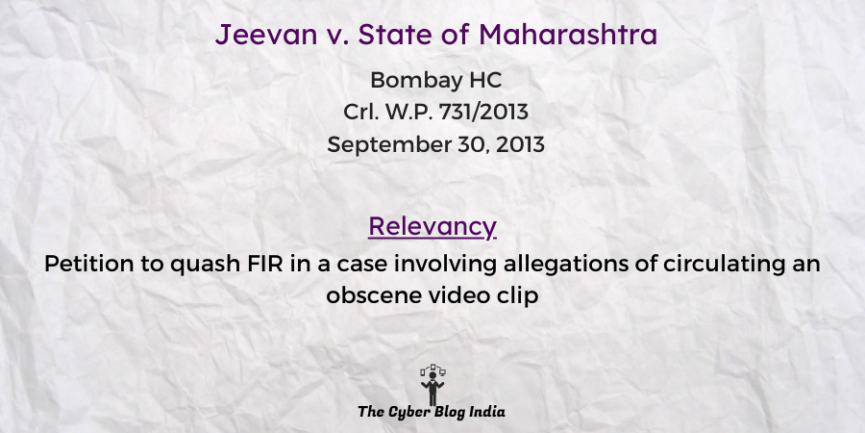Jeevan v. State of Maharashtra

Jeevan v. State of Maharashtra
(2014) 4 Bom CR (Cri) 682
In the High Court of Bombay
Crl. W.P. 731/2013
Before Justice Abhay M. Thipsay
Decided on September 30, 2013
Relevancy of the case: Petition to quash FIR in a case involving allegations of circulating an obscene video clip
Statutes and Provisions Involved
- The Information Technology Act, 2000 (Section 66A, 67A)
- The Indian Penal Code, 1860 (Section 34, 292, 293)
- The Code of Criminal Procedure, 1973 (Section 482)
- The Constitution of India, 1950 (Article 227)
Relevant Facts of the Case
- On September 23, 2011, the Beed City Police Station registered an FIR after receiving secret information about the circulation of an obscene video clip at Sagar Mobile Shoppee.
- The police found the petitioner and his servant with the said obscene video clip. The petitioner is the owner of Sagar Mobile Shoppee.
- The servant admitted that this video was copied from a mobile phone brought for repair by one Ramesh. Ramesh had recorded this video with a lady.
- The petitioner applied for discharge, and the Judicial Magistrate First Class, Beed, partially granted the discharge by excluding the charge under Section 293 of the Indian Penal Code, 1860, but retained the charge under Section 292.
- The petitioner approached the Sessions Judge for revision. However, the Sessions Court dismissed his application.
Prominent Arguments by the Advocates
- The petitioner’s counsel argued that
- There was no material evidence showing he circulated the obscene video clip.
- The possession of the clip alone, without proof of circulation, should not constitute an offence under Section 292.
- The prosecution claimed that the petitioner, as the owner of a mobile shop, had the means and opportunity to circulate the obscene clip. The clip’s presence on the petitioner’s phone indicated potential intent to distribute it.
Opinion of the Court
- The lower court’s reasoning was incorrect as no material evidence indicated the clip was circulated.
Final Decision
- The court allowed the petition and quashed the proceedings against the petitioner.
